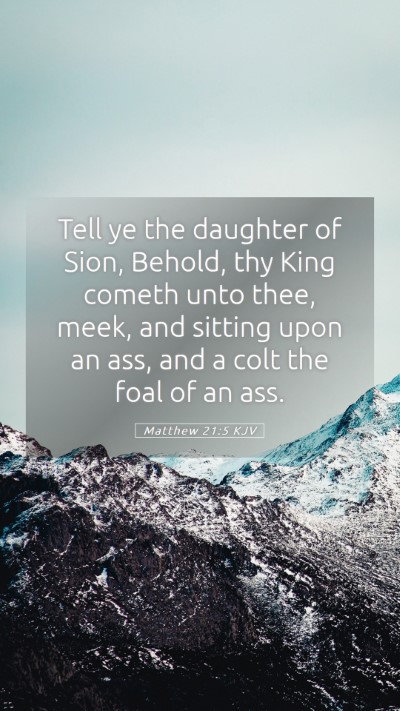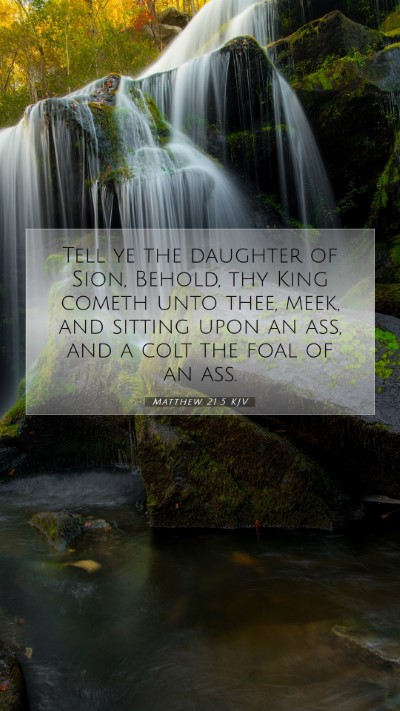Understanding Matthew 21:5
Matthew 21:5 states: “Tell the daughter of Zion, Behold, thy King cometh unto thee, meek, and sitting upon an ass, and a colt the foal of an ass.” This verse holds significant theological meaning, providing insight into the nature of Jesus as the Messiah and the fulfillment of Old Testament prophecy.
Bible Verse Meanings
The meaning of Bible verses often hinges on their historical and cultural context. In this case, Matthew 21:5 fulfills the prophecy found in Zechariah 9:9, which portrays the coming of a humble king. The phrase “daughter of Zion” symbolizes Jerusalem and the Jewish people, indicating the Messiah's arrival is deeply rooted in Jewish expectation.
Bible Verse Interpretations
- Meekness of Christ: Jesus rides into Jerusalem on a donkey, a sign of humility rather than a war horse, reflecting His peaceful mission (Matthew Henry).
- Fulfillment of Prophecy: This event highlights how Jesus fulfills Old Testament prophecies, linking the New Testament to the Old (Albert Barnes).
- Symbolism of the Donkey: The donkey symbolizes peace, contrasting the expectations of a conquering king (Adam Clarke).
Bible Verse Understanding
The understanding of Scripture reveals deeper meanings beyond the literal translation. This specific verse calls to a broader audience, including those who may not have physical access to the scriptures but engage with their faith through Bible study groups and online Bible study.
Bible Verse Explanations
Given the historical context of Bible verses, it’s essential to examine who Jesus was addressing and the implications. By entering on a donkey, He subverted expectations of a military Messiah, showcasing His role as a savior for all, emphasizing His accessible and humble nature.
Bible Verse Commentary
Commentators provide various perspectives on this verse:
- Matthew Henry: Emphasizes the kingly dignity of Christ juxtaposed with his humility.
- Albert Barnes: Notes the significance of the 'Zion' mention, aligning with Jewish prophetic literature.
- Adam Clarke: Highlights the act of riding on a colt, signifying a peaceful entry.
Scripture Analysis
This moment marks the beginning of the culmination of Jesus' earthly ministry, leading to His passion and resurrection. The procession into Jerusalem is often referred to as the triumphal entry, celebrated by Christians as Palm Sunday.
Biblical Exegesis
Exegesis of this text reveals intricate layers of meaning. By analyzing the original Greek text and cross-referencing with other biblical narratives, we see a well-orchestrated plan by Jesus to announce His messiahship. The public acknowledgment of Jesus as King amidst prophetic fulfillment signifies a pivotal point in the Gospels.
Cross References
- Zechariah 9:9: Prophecy of the king’s entry.
- John 12:15: Parallel account of the triumphal entry.
- Luke 19:35-40: Another account that aligns with Matthew’s depiction.
Applying Bible Verses to Daily Life
Understanding how to apply the teachings within Bible study lessons is crucial for practical faith living. Jesus’ entry demonstrates the importance of humility and peace in our own lives. As followers, we are called to reflect these qualities in our interactions, embodying the spirit of Christ-like leadership.
Conclusion
In summary, Matthew 21:5 encapsulates the essence of Jesus’ kingship through humility and serves as a reminder of the transformative power of His presence in our lives. Engaging with this verse through Bible study resources enhances our understanding and fosters a deeper relationship with Scripture.


